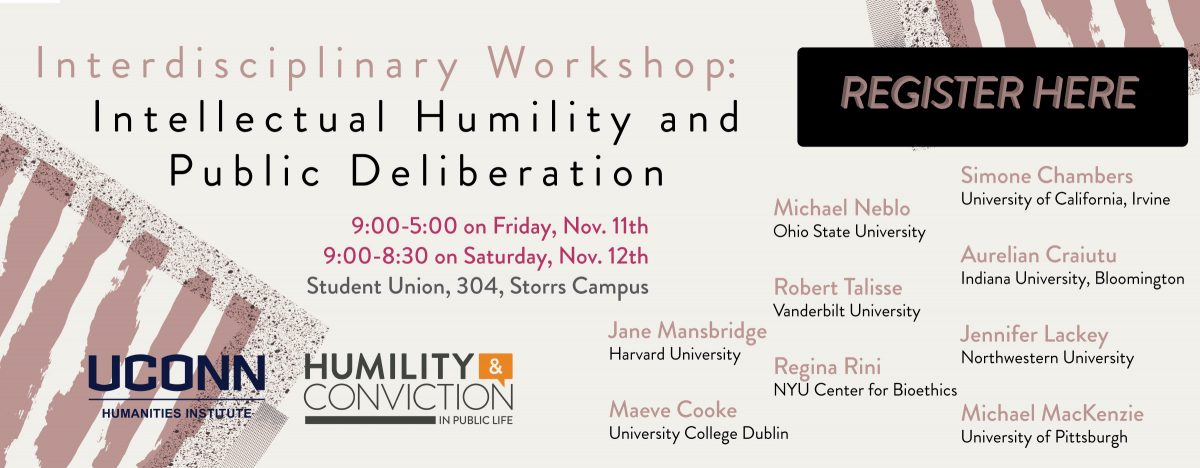- HCPL Capstone Workshop
- The Conviction Workshop
- Encounters: The Conference
- Educating for Intellectual Humility: Countering Arrogance and Servility
- Political Polarization and Epistemic Arrogance
- Religious Conviction and Intellectual Humility in Public Life
- Interdisciplinary Workshop: Intellectual Humility and Public Deliberation
- Voicing Dissent: The Ethics and Epistemology of Making Disagreements Public
- Tudor Ireland and Renaissance Court Society: Audience and Discourse
- Dialogue on Campus Dialogues
Interdisciplinary Workshop: Intellectual Humility and Public Deliberation
Dates: 9:00-5:00pm on Friday, November 11th and 9:00-8:30 on Saturday, November 12th
Location: Student Union 304
Full schedule available here.
All registered participants will receive lunch on Friday, and lunch and dinner on Saturday.
Although not stated using the particular phrase, something like intellectual humility in public discourse appears to be one of the foundational aspects of deliberative theory. For example, Rawls’s concept of the fact of reasonable pluralism, Habermas’s theory of testing validity claims, and even Fishkin’s call for a more reflective public opinion all rely upon the basic assumption that citizens accept that they and those like them might not be correct in their beliefs or preferences. Citizens must, at least eventually, be open to the possible influence of others with whom they disagree; without this possibility, it would be hard to call the democracy deliberative. This workshop will bring together leading scholars and promising new researchers from philosophy, political theory, and political science to discuss topics at the intersection of intellectual humility, public reason, and deliberation. Topics include the place and nature of intellectual humility in public discourse, the possible determinants that mitigate against or encourage its presence (e.g. open‑mindedness, tolerance, and empathy); and the ways in which intellectual humility arises in actual public discourses and practices of deliberation.
Speakers include: Jane Mansbridge (Harvard), Jennifer Lackey (Northwestern), Maeve Cooke (University College Dublin), Robert Talisse (Vanderbilt), Mark Warren (University of British Columbia), Simone Chambers (UC Irvine), Aurelian Craiutu (Indiana), Michael Neblo (Ohio State), Regina Rini (NYU), and Michael MacKenzie (Pittsburgh).
Speaker abstracts and bios are below.
To see the full schedule, click here.
Speakers and Abstracts
 Aurelian Craiutu
Aurelian Craiutu
Indiana University, Bloomington
Aurelian Craiutu is Professor of Political Science at Indiana University, Bloomington. His main research interests are in modern French political thought. He has published extensively on and has edited the writings of Alexis de Tocqueville, Madame de Staël, and the French Doctrinaires. His most recent book is A Virtue for Courageous Minds: Moderation in French Political Thought, 1748-1830 (Princeton University Press, 2012). His new book, Faces of Moderation: The Art of Balance in an Age of Extremes will be released by University of Pennsylvania Press in December 2016.
Abstract: Moderation and Meekness: Two Virtues for Courageous Minds
Ever since Machiavelli, the symbols often used to describe successful politicians have been the fox, as an image of shrewdness, and the lion, well-known and feared for his force. As a symbol of innocence, meekness, and moderation, the lamb is almost never mentioned as a model to follow. Why is this so? Have we all become “Machiavellians,” or are we all under Machiavelli’s spell? My paper which draws on my new book Faces of Moderation (Penn Press, 2016) offers a few answers to explain this paradox. Starting from the assumption that political moderation constitutes a coherent, complex, and diverse tradition of thought, it explore one face of moderation, meekness. To this effect, I draw on the works of Norberto Bobbio (1909-2004), a prominent Italian political thinker who provided a classic statement on the virtues of meekness.

Maeve Cooke
University College Dublin
Maeve Cooke is Professor of Philosophy at University College Dublin, Ireland and a member of the Royal Irish Academy. Her current research interests focus on questions of freedom and political authority; she is also working on questions relating to democratic dissent and on political violence. Her principal book publications are Language and Reason: A Study of Habermas’s Pragmatics (MIT Press, 1994) and Re-Presenting the Good Society (MIT Press, 2006). She has published many articles in scholarly journals and books in the areas of social and political philosophy. She has held visiting appointments at universities in the USA and Europe and is on the editorial board of a number of scholarly journals.
Abstract: Deliberation as Mutual Learning: Freedom, Authority, Identity
The workshop invites reflection on intellectual humility in public discourse as a foundational aspect of deliberative theory: citizens accept that they might not be correct in their beliefs or preferences and are open to the influence of others with whom they disagree. I endorse this view of deliberative democracy, interpreting it as a call for mutual learning among citizens. But why is mutual learning important? My thesis is that mutual learning among citizens is necessary for both individual freedom and democratic political authority, in the sense that is constitutive for both. By extension it is also a constituent of collective identity. The model of democratic politics corresponding to this thesis takes its lead from Habermas’ deliberative approach but departs from it in a number of respects.
 Michael Neblo
Michael Neblo
Ohio State University
Michael Neblo's research focuses on deliberative democracy and political psychology. His book, Deliberative Democracy between Theory and Practice (Cambridge University Press, 2015), cuts across the deadlock between supporters of deliberative theory and their empirical critics by focusing on the core goals of the larger deliberative political system. His work has appeared or is forthcoming in a wide range of academic journals, including The American Political Science Review, The Journal of Political Philosophy, Political Analysis, Public Opinion Quarterly, Political Behavior, Political Research Quarterly, Perspectives on Politics, Political Communication, Acta Politica, The Journal of Medicine & Law, Social Science & Medicine, as well as in edited volumes. With various colleagues, Neblo has been the recipient of awards and fellowships from the Mellon Foundation, the Robert Wood Johnson Foundation, the Veterans Administration, the International Society for Political Psychology, the Ash Institute, and a large grant from the National Science Foundation to design and study electronic town-hall meetings with the cooperation of members of the U.S. Congress.
 Regina Rini
Regina Rini
NYU Center for Bioethics, New York
Regina Rini joined NYU Bioethics in September 2014. From 2011 to 2014 she was a postdoctoral research fellow at Oxford University and a junior research fellow of Jesus College Oxford. Before that she completed a doctorate in philosophy at NYU and did neuroscience research at Georgetown Medical Center. Her main research interests are in moral psychology, particularly concerning the relationship between the conscious moral self and the nonconscious processes out of which it is made. She is also interested in questions about moral difference and disagreement, procreative ethics, and moral responsibility for historical injustice.
Abstract: Moral Disagreement is Special
Most of the literature on moral disagreement is framed entirely in epistemic terms. I argue that this framing is misleading, as moral disagreement is special and unlike peer disagreement in other epistemic domains. I defend the claim that peer moral disagreement gives us reason to reduce confidence in disputed moral beliefs, but not for epistemic reasons. Rather, we have moral reason to do so. Reducing confidence in this way is morally required by recognition respect for the agency of the peer with whom we disagree. Though this paper is primarily about moral disagreement, I take its core argument to apply to political disagreement as well.
 Simone Chambers
Simone Chambers
University of California, Irvine
Simone Chambers is a Professor of Political Science at the University of California at Irvine. She has written and published on such topics as deliberative democracy, public reason, the public sphere, secularism, rhetoric, civility and the work of Jürgen Habermas and John Rawls. She recently published an edited volume with Peter Nosco on navigating pluralism: Dissent on Core Beliefs: Religious and Secular Perspectives (Cambridge University Press, 2015). She is presently working on a project entitled An Ethics of Public Discourse which applies deliberative theory to the broad and informal public sphere using a system approach.
Abstract: A Procedural Approach to Public Reason and Humility
Deliberative democracy often includes an unrealistic ethical and/or psychological expectation that individuals be willing to revise their positions in light of counter arguments and alternative reasoning. Public reason advocates introduce an equally unrealistic standard of public debate when they insist that citizens and their representatives ought to be constrained by a duty of civility – a form of epistemic humility. Rather than revisability or publicness, in this paper I introduce the weaker standard of criticizability. Criticizability is an attribute of utterances and dependent on the public sphere context in which the utterances are made. It is not an ethical or psychological disposition. In stressing criticizability, this model of deliberative democracy shifts the focus from speakers to audience in the public sphere. What becomes important is not whether individual speakers are willing to change their mind or suppress their deepest convictions it is whether those who hear them speak also hear the counter arguments and criticisms.
 Jennifer Lackey
Jennifer Lackey
Northwestern University
Jennifer Lackey specializes in epistemology and philosophy of mind. Her recent research focuses on the epistemology of testimony, norms of assertion, epistemic luck, credit for knowledge, and the epistemic significance of disagreement. She has co-edited (with Ernest Sosa) The Epistemology of Testimony (2006, Oxford University Press) and is the author of Learning from Words: Testimony as a Source of Knowledge (2008, Oxford: Oxford University Press). She has been the recipient of a Charles A. Ryskamp Research Fellowship through the American Council of Learned Societies (2007-2008), as well as a Summer Stipend through the National Endowment for the Humanities. She is also a winner of the Young Epistemologist Prize (2005).
Abstract: Intellectual Humility and Norms of Credibility
What is the norm governing our credibility assessments of others? According to Miranda Fricker, the answer is “obvious”: we should match the level of credibility attributed to others to the evidence that they are offering the truth. Testimonial injustice occurs, on this view, when a speaker is given a credibility deficit, which is less credibility than the evidence calls for. In this paper, I show that this evidentialist norm fails to recognize the role that credibility surpluses, and evidence that we ought to have, play in our credibility assessments of others, thereby leading to the identification and development of two further kinds of testimonial injustice:distributive and normative. I then develop and defend an alternative norm—what I call the Wide Norm of Credibility—that not only avoids the problems afflicting the evidentialist version, but also makes vivid the role that intellectual humility needs to play in our epistemic lives.
Jane Mansbridge
Harvard University
Jane Mansbridge is the Adams Professor at Harvard’s Kennedy School of Government and a former president of the American Political Science Association. She is the author of Beyond Adversary Democracy and the prize-winning Why We Lost the ERA, as well as editor of Beyond Self-Interest and four co-edited volumes: Feminism with Susan Moller Okin, Oppositional Consciousness with Aldon Morris, Deliberative Systems with John Parkinson, and Political Negotiation with Cathie Jo Martin. Her work on deliberation includes, along with "Everyday Talk in the Deliberative System," the three “deliberatively co-authored” works, “Deliberative Negotiation,” with Mark Warren and eleven other co-authors, “A Systemic Approach to Democratic Deliberation,” with seven co-authors, and “The Place of Self-Interest and the Role of Power in Deliberative Democracy,” with eight co-authors.
 Michael MacKenzie
Michael MacKenzie
University of Pittsburgh
Michael MacKenzie’s research interests include democratic theory, intergenerational relations, deliberation, political representation, institutional design, and public engagement. Much of his work focuses on the political theory of intergenerational relations and the challenges of making long-term decisions in democratic systems. He recently helped design and conduct a laboratory experiment to explore the relationship between deliberation and long-term thinking. He is also a research partner with Participedia, an open-source, online encyclopedia and database of public engagement processes used around the world. In 2006-07 he worked as a policy analyst and facilitator with the Ontario Citizens’ Assembly on Electoral Reform. Before coming to the University of Pittsburgh he was a Democracy Fellow and post-doctoral researcher at the Ash Center for Democratic Governance and Innovation at the Harvard Kennedy School.
Abstract: Ourselves in Time: Humility, Deliberation, and Future Others
Modern societies tend to elevate the needs of the present over those of the future, but the opposite problem — elevating the future over the present — is equally undesirable from the perspective of intergenerational justice. In this paper, I argue that the concept and practice of humility can help us balance these two opposing concerns of intergenerational justice. Humility can help encourage individuals (and generations) to keep their own sense of importance in time in perspective. I also argue that humility may be either encouraged or discouraged by our political philosophies and our institutional practices. In an effective deliberative environment, for example, political actors may be forced to more accurately assess their own abilities and limitations, and they may be encouraged to reassess the relative importance of their personal concerns in response to the concerns of others. These can be humbling experiences, but this way of thinking (encouraged by deliberation) is precisely what is required if we are to more effectively balance the legitimate concerns of the present with those of the future.
 Robert Talisse
Robert Talisse
Vanderbilt University
Robert B. Talisse is W. Alton Jones Professor of Philosophy, Professor of Political Science, and Department Chair of Philosophy at Vanderbilt University. He works primarily at the intersection of democratic theory and social epistemology. He is a former editor of the journal Public Affairs Quarterly, and the author of over 100 academic articles and several books, including Democracy and Moral Conflict (Cambridge University Press), Why We Argue (with Scott Aikin, Routledge), and, most recently, Engaging Political Philosophy (Routledge).
Abstract: New Trouble for Deliberative Democracy?
Deliberative democracy has been the focus of intense theorizing for several decades, yet the extant theories tend to fix on deliberative encounters between only two parties. Accordingly, familiar analyses of citizens’ deliberative behavior emphasize duties concerning how interlocutors are to treat each other within the context of civic disagreement. But contemporary political discourse occurs most often in the presence of an on-looking audience. Indeed, a great deal of political argumentation is conducted not for the sake of rationally moving one’s interlocutor, but rather for the purpose of affecting the audience to the dispute. There are distinctive ways in which public deliberation can go wrong when it is conducted before an audience; to be specific, there are ways in which public deliberation can turn pathological even when the interlocutors are satisfying the standard deliberative norms with respect to each other. Deliberative democrats need to theorize these distinctive “third party” failings. In this paper, I identify a few of them and argue that they constitute new trouble for deliberative democratic theory.
 Hélène Landemore
Hélène Landemore
Yale University
Hélène Landemore is Associate Professor of Political Science. Her current research interests include democratic theory, theories of justice, the philosophy of social sciences (particularly economics), constitutional processes and theories, and workplace democracy. She is the author of Hume, Probabilité et Choix Raisonnable (PUF: 2004) and Democratic Reason: Politics, Collective Intelligence, and the Rule of the Many (Princeton University Press 2013). She is also co-editor with Jon Elster of Collective Wisdom: Principles and Mechanisms (Cambridge University Press 2012). Her articles have been published in, among others, Journal of Political Philosophy, Political Theory, Politics, Philosophy, and Economics, and Political Psychology. She is currently at work on a new book, tentatively entitled “After Representation: Rethinking Democracy for the 21st Century,” which lays out the principles of post-representative (or “open”) democracy.
